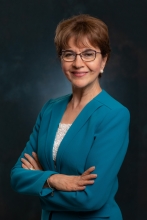CBE Seminar (Zoom): Catalytic Treatment of Water Contaminated with Halogenated Hydrocarbon

College of Engineering Distinguished Professor
Chair, William G. Lowrie Department of Chemical and Biomolecular Engineering
The Ohio State University, Columbus, OH
Registration Link:
https://forms.gle/f5byXJzRLjJAKE2EA
Abstract: Groundwater contamination by halogenated compounds such as trichloroethylene (TCE) is an environmental concern due to their high level of toxicity and their potential impact on drinking water. Hydrogenation of chlorinated compounds offers an efficient and cost-effective way of decontaminating groundwater since it eliminates the chlorinated compounds by catalytically converting them to hydrocarbons and hydrogen chloride. Although promising conversions have been obtained with the palladium-based state-of-the-art catalysts, slow kinetics at low temperatures and low concentrations as well as deactivation due to reduced sulfur and chlorine species (SO42-, HS-, Cl-) are still recurring problems. To overcome these issues, we are using a newly developed material, a swellable organically modified silica (SOMS) as a catalyst scaffold. SOMS is a very hydrophobic material, but it has a very high affinity for organics. These characteristics allow the organic contaminants to concentrate inside the pores, near the active sites, hence helping the kinetics. Hydrophobicity serves as a deterrent to deactivation by keeping the water-dissolved poisons away from the active sites. Activity measurements performed in liquid and gas phases as well as catalyst characterization results will be presented.
Bio: Umit S. Ozkan is a Distinguished Professor and chair of the William G. Lowrie Department of Chemical and Biomolecular Engineering at The Ohio State University. She received her doctorate from Iowa State University in 1984 and joined the faculty of The Ohio State University in 1985. Between 2000 and 2005, she also served as the associate dean for research in the College of Engineering. Her current research interests are focused on heterogeneous catalysis and electro-catalysis.
She has edited eight books, written over 200 refereed publications and book chapters, given over 350 conference presentations and over 150 invited lectures in 20 different countries. She has eight patents and over 11,000 citations with an H-index of 60. Ozkan has held and continues to hold many leadership positions in several professional organizations, including ACS, AIChE and North American Catalysis Society. She is on the editorial boards of Catalysis Today, Journal of Molecular Catalysis, Catalysis Letters, Topics in Catalysis, The Royal Society of Chemistry Catalysis Book Series, Applied Catalysis B, ACS Applied Energy Materials, Catalysis Reviews in Science and Engineering, ACS Catalysis, and Nature Sustainability. Ozkan is a Professional Engineer registered in Ohio. She is a fellow of the American Association for the Advancement of Science (AAS), American Institute of Chemical Engineers (AICHE), and American Chemical Society (ACS).
Professor Ozkan is the recipient of many honors and awards among which are the ACS Henry H. Storch Award (2017), ACS Energy and Fuels Distinguished Researcher Award (2012), John van Geuns Lectureship Award at the Van't Hoff Institute at the University of Amsterdam (2010), Iowa State University Professional Achievement Citation in Engineering (2010), AIChE Mentorship Excellence Award (2009), Fulbright Senior Scholar Award (2007) and the Society of Women Engineers Achievement Award (2002). In 2013, she was honored by a special volume of Topics in Catalysis. The volume included contributions from 35 different research groups from 12 different countries. In 2019, she was again honored, this time by a special volume of Catalysis Today.
In her research group, Ozkan has advised and mentored over 100 graduate students, postdoctoral researchers and honors students.
Share
Upcoming Events
-
EECS Seminar: Less Compute, More Intelligence – Efficient and Autonomous Generative AI and Agents
-
MAE 298: Microscopic Robots that Sense, Act and Compute
-
CBE 298 Seminar: Interface Modification for Electrocatalysis
-
CEE Ph.D. Defense Announcement: Machine Learning and Remote Sensing for Environmental Modeling - From Large-Scale Streamflow Forecasting to Malaria Risk Mapping
-
CBE Special Seminar: Operando Electrochemical Methods at Dynamic Energy Materials Interfaces
